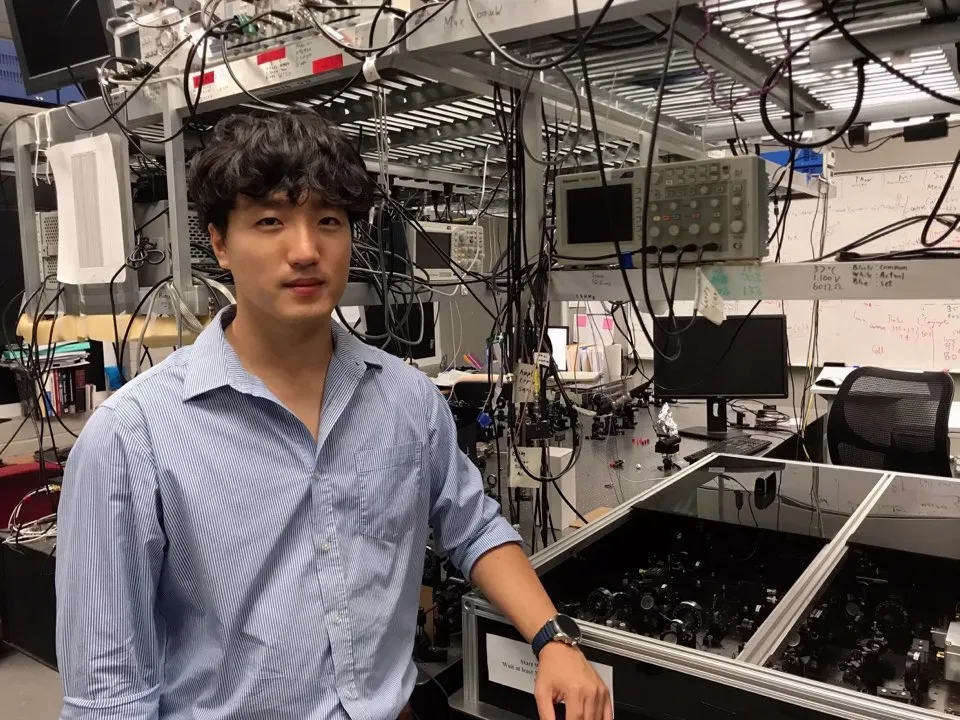We get to talk to Saesun Kim who is a researcher at the University of Oklahoma. We get to ask Saesun Kim about his work and where Quantum computing is headed, but importantly we get an inside look at the research that goes on in fundamental physics – eminently useful for Quantum Computing.
QZ: How did your interest in Quantum Computing start?
When I was an undergraduate, I was fortunate to take a quantum computation class. During the class, I was excited that we are experiencing a new scientific revolution. With all the strangeness of quantum mechanics and powerful application toward computation, I was fascinated and decided to study quantum physics, and now I am pursuing a Ph.D. degree in experimental quantum optics.
QZ: Please tell us about your work and what you are aiming to achieve with your research.
I am working on generating a special type of quantum light, called a squeezed state of light. This is scientifically interesting, but it has great potential toward quantum sensors. LIGO currently relies on squeezed light to enhance its sensitivity to measure the gravitational wave. My work is generating squeezed light that can interact with atoms and extend this squeezed light to multiple-party (multipartite entanglement) so that we can extend our application of squeezed light to atomic sensors and other applications.
QZ: Give everyone a single human-readable sentence to describe your work.
Everywhere, we have noise. It is almost impossible to get rid of the noise. Using quantum mechanics, we can reduce the noise of the light. Since light is used in many different areas to measure the signal (sensor, communication, computation), we can use this quantum light to enhance current technology. I am particularly working on improving this quantum light so that we can work with atom and many other systems.
QZ: You are currently pursuing your PhD, what do you want to do afterward? Academia? Start-up or join a company?
At the moment, I am planning to work in the industry. With lots of fascination toward quantum technology and much government funding in companies, I am certain that my knowledge can contribute to society. However, there is so much interesting research related to quantum computing nowadays, I am also considering staying in academia to pursue in physics a little more.
QZ: What is your favorite Quantum Toolset? (i.e. programming language, toolset, framework)
My favorite language is Mathematica and MATLAB. Since I am an experimental physicist, I use the programing language to visualize my data. Mathematica and MATLAB are a wonderful tool to visualize and present the data.
QZ: What aspect of Quantum has surprised you the most?
The trajectory of light (Superposition and more). This leads me to love quantum physics. It does not make sense at all. In my senior year in college, I read “Phys. Rev. Lett. 113, 120406,” they showed that light can travel extraordinary paths such as looping around the object. Using Feynman integral, they were calculating the non-classical contribution of the light. This changes the way I think about physics and surprised my young brain.

QZ: Where do you see your research work having its biggest impact?
First, quantum sensors. This will soon revolutionalize many fields of science such as medical, military, communication, weather, self-driving car, and so on. My work will particularly impact the atomic magnetometer, atomic interferometer.
Recently, there are pioneering works toward generating one-way quantum computation using quantum light by Pfister, Menicucci, Furusawa, and many other physicists. I am currently working on a related topic, and I hope my current work can impact the area too.
QZ: What is the most challenging part about working in the Quantum Computing domain?
There are many different approaches to realize quantum computation. Since I am working with quantum light, I will only discuss the challenge with the quantum computer with light. To realize quantum computation using light, we need to scale up to have many qubits. Currently, people can generate entanglement in millions of light mode called cluster state. However, it is still difficult to generate non-gaussian states such as the GKP state to operate error correction. Another challenge is generating a strong entanglement between them. These limit to generate quantum computation using light, but I am very optimistic that people will find a way to solve the problem soon.
QZ: When do you see Quantum Computing as getting mass traction and mainstream appeal?
When I joined my Ph.D. program, the Best quantum computer was with 12 qubits. Now, I can find news about 128 qubits. Optimistically, in 20 years, we will be able to generate the universal workable quantum computer, and in 30 years, we will see the revolution.
QZ: How can people learn and get into Quantum Computing?
IBM provides a user-friendly platform, Qiskit. You can use their real quantum computer and simulate some of the algorithms. Many people are working together to build the program and document, so I encourage people to check their website.
QZ: What career advice can you give about getting into the QC space.
There are many different fields that quantum computation can be beneficial. If you are just open-minded about learning a new subject. it won’t be any problem for anyone to pursue a career in quantum computation.
You don’t need to know how to use a logic gate or C++ to use excel or the internet. Soon, Quantum computers will become an ordinary computer that people can use quantum software. This will be a powerful tool in finance, research, and programming. If you are opened toward the new tech and willing to learn, it won’t be any problem to work with a quantum computer.


